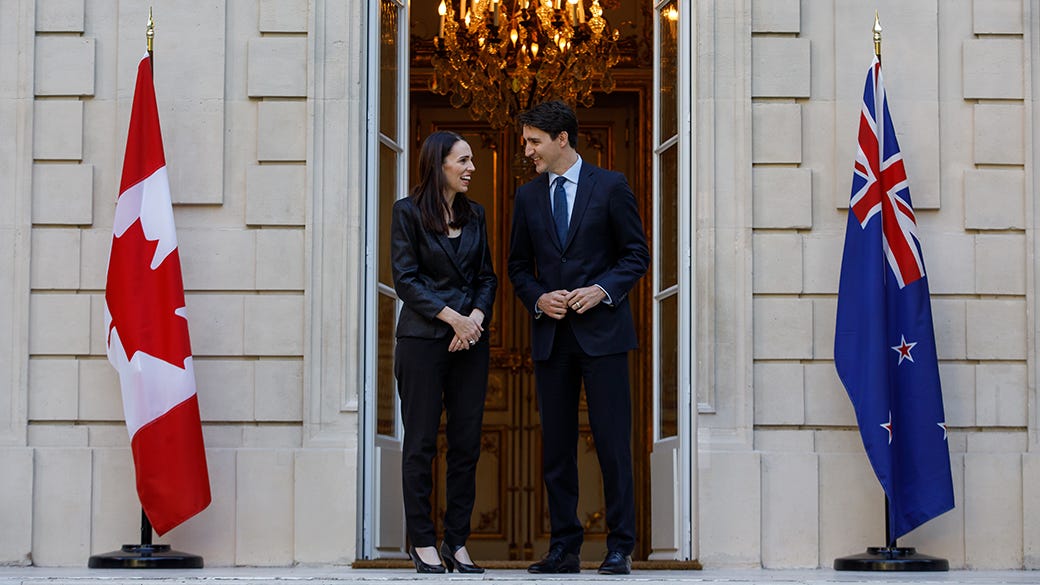Mitch Heimpel: The rise (and fall) of a particular kind of lefty leader
The young progressive leaders of the 2010s are fading away. It doesn't seem that even the left will miss them.
By: Mitch Heimpel
With Jacinda Ardern's resignation, it feels like the era of a certain kind of politician is at an end.
The 2010s saw the rise of a kind of trendy technocrat politician, modelled on the style and, vaguely, the politics of Barack Obama. In the period from 2011 to 2017, these big data-driven Gen X heirs to Obama would include Alexis Tsipras in Greece, Matteo Renzi in Italy, Mark Rutte in the Netherlands, and perhaps the most prominent trifecta: Justin Trudeau in Canada, Jacinda Ardern of New Zealand, and Emmanuel Macron of France.
All of them were either centrists who pulled their left-wing parties into the mainstream; or previously passionate leftists who made their own political migration to the middle. With Ardern's resignation, only Rutte, Trudeau and Macron remain. Rutte remains in power, the longest-serving prime minister in Dutch history, and seems to be in a stable place, though Dutch politics is chaotic and hard to predict. Macron is term limited. Trudeau is facing the worst polls of his time in office.
In retrospect, these politicians seem a product of their era in a way that perhaps no class of political leaders has since the 1980s. They are cozily nestled between two great invasions of reality into our otherwise gilded post-Cold War world: the Global Financial Crisis and the COVID-19 pandemic. The European leaders like Renzi or Tsipras or Macron seem every inch the product of the Eurozone crisis. A kind of southern European rebellion against austerity that was fuelled by rock-bottom interest rates and a generational struggle between an older nationalism and a younger continentalism. Trudeau and Ardern shared a lot of the generational challenges, and policy preferences, of their European colleagues, but also added layers of climate activism and very vocal feminist branding.
Most of this cohort never made it to the pandemic. Macron seems to have successfully avoided being defined by it, coasting to re-election last year. The outlook in that regard is very different for Ardern, and potentially, Trudeau. New Zealand and Canada had similar policy impulses on handling the COVID-19 pandemic. New Zealand's travel restrictions — owing to its geographic advantage, but also the fact that it actually implemented travel restrictions instead of just endlessly talking about them — were more effective. But both used public-health measures like lockdowns and travel restrictions to a significant degree. At the end of 2022, these restrictions, and the economic aftershocks of the pandemic, seemed to have taken their toll on Ardern's chances for re-election.
For Trudeau, such criticisms about his pandemic approach are now standard fare, even from Liberals. There seems to be no real legacy to this kind of politics. Where left-wing parties have been on the ascendancy in recent years, it has been with something both older and significantly less image-conscious than the Obamas, Macrons, Trudeaus and Arderns of the last decade. Labour looks like a good bet to end a 14-year Tory dynasty in the U.K. in 2024, but it will be doing so with the stodgy Boomer, Sir Keir Starmer. The long reign of the Christian Democrats in Germany was ended by the thoroughly untrendy Boomer, Olaf Scholz. Largely the same thing happened in Australia with the election of Anthony Albanese.
And then, of course, there's Joe Biden. Hardly a new, young progressive technocrat, Biden. He’s an old-school Democrat right out of the late 20th century — and, in fact, was chosen precisely for that reason by young-gun Obama … 15 years ago. He’s even more old school now.
These positively dull men (and, so far, they have all been men) have one very obvious thing in common — a litany of public service experience prior to becoming party leaders. As inflation makes a decades-delayed return to the public-policy conversation, and as a major land war involving a great power ravages Europe for the first time since 1945, the seeming twilight of the progs from the 2010s could be as simple as the music having finally stopped on an era of "Yes We Can-ism," and the politicians that it produced.
I've been thinking about this since I watched Pete Buttigieg in the 2020 Democratic primaries. In so many ways, he seemed a politician straight out of the same era that gave us Justin Trudeau's socks and Barack Obama's March Madness bracket. His political skills are still there. He's capable of playing the game at a high level, as the scouts say. He fits that perfect McKinsey-Davos mould that seemed to give us the last decade of progressive leaders. But, in keeping with trends, it's worth noting that every candidate that finished ahead of him in those primaries was born in the 1940s.
None of this precludes Buttigieg from eventually becoming president, it just feels like he missed the moment where his unique combination of braininess, and charisma would have made him a sure thing. And none of the above means that Trudeau is doomed. But the sun does seem to be setting on the last of these leaders. And, while the right never liked them, it doesn't seem like the left will miss them, either.
Mitch Heimpel has served Conservative cabinet ministers and party leaders at the provincial and federal levels, and is currently the director of campaigns and government relations at Enterprise Canada.
The Line is Canada’s last, best hope for irreverent commentary. We reject bullshit. We love lively writing. Please consider supporting us by subscribing. Follow us on Twitter @the_lineca. Fight with us on Facebook. Pitch us something: lineeditor@protonmail.com

